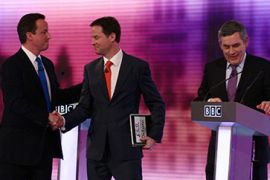
UK’s election drama
The media’s lack of impartiality in the elections and a look at embedded journalism.
Part two
This week on the Listening Post: Post-election confusion in Britain splits the media along party lines and we report on the increasing dependence on embedded reporting in Afghanistan for coverage of the war there.
As the dust settled following a hectic campaign season, the votes were cast and tallied and the result was unclear. For the first time in nearly 70 years, Britain’s voters gave no party a clear majority and the country was headed for a hung parliament.
Keep reading
list of 4 itemsInside the pressures facing Quebec’s billion-dollar maple syrup industry
‘Accepted in both [worlds]’: Indonesia’s Chinese Muslims prepare for Eid
Photos: Mexico, US, Canada mesmerised by rare total solar eclipse
In the political wrangling that followed, British newspapers made clear that they shared none of the confusion felt by voters in the UK. The right-wing press, bolstered by the strong sentiment against Gordon Brown, the incumbent prime minister threw their editorial might behind David Cameron, the Conservative party leader.
The media split was so intense, it spilled onto British television – which operates under strict rules of impartiality and equal coverage for opposing political parties. Rupert Murdoch’s Sky News came under fire the most for what viewers and on air pundits felt was the partiality of its presenters towards the Conservative Party.
If politics is the art of the possible and journalism is the first, rough draft of history, then our News Divide this week on the British media’s coverage of the coalition talks will give you a glimpse of a first draft that was rough and tumble.
Quick hits from the media world in Newsbytes: As the oil spill in the Gulf of Mexico spread, BP struggles to contain its ballooning PR problem. JS Tissanayagam, a Sri Lankan Tamil journalist sentenced to 20 years imprisonment, gets a pardon from the government.
In the US, Barack Obama, the US president surprises a young audience with his warning about ‘information overload’ in the new media age. And one world leader who would disagree with Obama’s new media warning is Hugo Chavez, the Venezuelan president, who has just joined Twitter.
Embedded in Afghanistan
Our feature story this week shines the spotlight on embedded journalism in Afghanistan. Embedding – pairing news reporters with military units on the battlefield – is not new, but in the course of the Iraq and Afghan wars, it has become ever more important both to the militaries fighting the war and the correspondents attempting to cover on it.
For the soldiers on the ground, embedding gives them a measure of control over the media message and for news organizations and reporters, the trade-off between some of their editorial independence and access to the frontlines is one that is becoming ever more viable as security concerns become greater and financial constraints tighter.
The Listening Post’s Meenakshi Ravi reports this week on embeds, the advantages, the pitfalls and the journalists who take issue with this kind of reporting.
It is so hard to lead an active life living in a city, or is it? Parkour is an urban discipline that teaches its followers to overcome obstacles their way by adapting their body’s movement to the environment they find themselves in. Watch this video of Damien Walters keeping himself busy around town. That all said, it is probably best that you do not to try this at home (or on the street!).
This episode of The Listening Post can be seen from Friday, May 14, at the following times GMT: Friday: 1230; Saturday: 1030, 2230; Sunday: 0300, 1930; Monday: 0030; Tuesday: 0630, 1630; Wednesday: 0130, 1430; Thursday: 0330, 2330.